Do you find yourself trapped in a repetitive pattern of similar situations that all end in failure and heartache? Maybe you are letting the 4 trauma responses govern your life and relationships.
Thanks to increasing global awareness of mental health, most of us are familiar with the long-term effects of trauma or PTSD (Post-Traumatic Stress Disorder). We also know that traumatic experiences are not confined to people who have been to wars.
Experiencing trauma is a highly individualized and subjective matter. Any event that made us feel unsafe, vulnerable, shocked, or helpless, can be a traumatic incident for us and the experience can have far-reaching effects on our lives.
Here are a few examples of Trauma:
- Repeated trauma, such as childhood abuse
- Single Incident trauma, such as being assaulted or mugged
- Ongoing trauma, experienced by the soldiers and first responders
- Other traumatic life events include cheating, a bad breakup, witnessing a crime, etc.
What Is A Trauma Response?
The defense mechanism that we rely on, in the face of fear or danger becomes our trauma response. These are evolutionary responses that helped our primitive ancestors to combat predatory animals and other dangers.
These instinctive responses to danger are embedded within our system and become our go-to survival strategy when we are presented with a situation that seems to be threatening our safety. These coping mechanisms are called our 4 trauma responses.
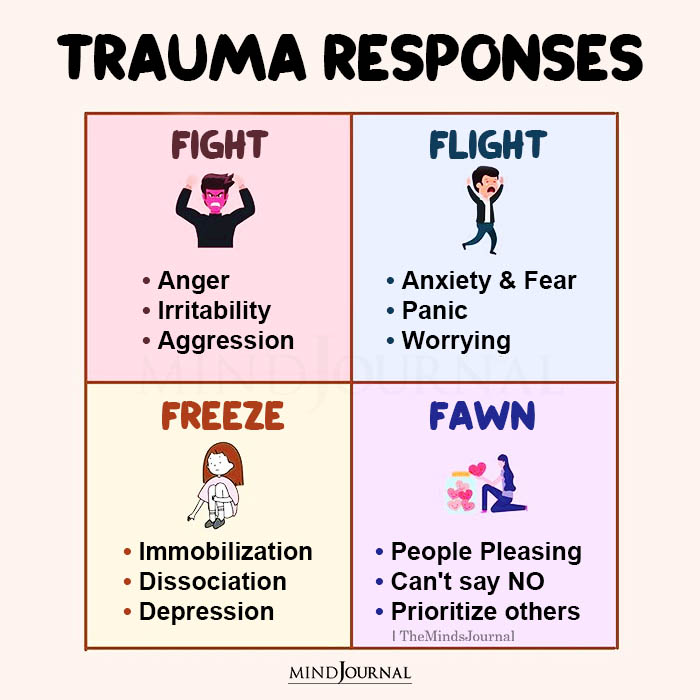
What Are The Four Trauma Responses?
There are 4 common trauma responses, also popularly termed the Four Fs of trauma responses:
- Fight
- Flight
- Freeze
- Fawn
Before getting into these 4 types of trauma responses one by one, let’s understand the tricky part first.
For those of us who have never experienced any traumatic incident in our lives, these 4 trauma responses can prove to be healthy responses to stress and fear and help them safeguard themselves when they encounter a risky or life-threatening situation.
But what if the danger is not real? Yes, sadly, people who have experienced significant trauma in the past, get fixated on one or more of these 4 trauma responses.
These survival instincts had helped them in the past, maybe for a prolonged time. So, they unknowingly over-rely and ingrain these maladaptive versions of the 4 trauma responses in their psyche.
As a result, they are perpetually on a hair-trigger mode, easily getting activated at the drop of a hat. These unconsciously learned 4 trauma responses become unhealthy for them, stimulating an overwhelming sense of intense fear, even when the danger is a perceived one.
How Can The 4F Trauma Responses Keep Your Life On Hold?
Now, let’s know about each of these 4 trauma responses and how can they be potentially unhealthy for you.
1. Fight

If you have adapted the “Fight” response, you are more likely to be confrontational in your relationships. Whenever you face a stressful situation, you subconsciously infer that gaining control over the matter will get you out of the mess.
You are prone to display the following traits:
- Angry outbursts
- Demanding nature
- Easily getting enraged
It has been theorized that people who are driven by the “Fight” trauma response, tend to avoid intimate relationships by being difficult. Their trauma makes them believe that such relationships will make them vulnerable and ultimately lead them to get rejected by their partner.
People who have a traumatized childhood quite often resort to this kind of behavior in their adult relationships. If they had been rejected or abandoned by their parents, they would tend to alienate others as adults.
They would do this out of the fear of facing the same rejection or abuse they faced as a child and would adopt the “Fight” response as one of their long-term responses to childhood trauma.
2. Flight

Along the same line, if you have a habit of fleeing the scene the moment things get difficult, you too are unconsciously avoiding serious relationships, so that no one can hurt you. If you have adopted the “Flight” trauma response, you will display the following signs:
- Distracting yourself with obsessive thoughts or Overthinking
- Overdoing things out of compulsion
- Becoming a workaholic
- Being a perfectionist
- Thrill-seeking risky behavior
- Controlling nature
The bottom line is that you will find ways to make yourself so busy that you are not left with time to form any meaningful relationships with others. Your overachieving tendencies might stem from the belief that this is the only way to make yourself safe and secure. Burying yourself at work or engaging in reckless behavior give you a false sense of security.
Read: What Am I Subconsciously Afraid Of Quiz
3. Freeze
The Freeze type often has a deeply disturbing and traumatic childhood. Their life as children was so unbearable that they had to dissociate themselves from reality and seek comfort in sleep or fantasy. As a child, they frequently:
- Slept excessively or stayed in bed for long hours
- Daydreamed a lot
- Kept to themselves and were not social
- Engaged in solo activities, such as video games, reading, etc.
- Became immobile or catatonic
If you are a Freeze type, you have carried these survival strategies with you from your early years. You unwittingly sabotage your romantic life and keep your partners at arm’s length by remaining aloof and recluse. You don’t participate in building strong relationships and continue taking refuge in your fantasies.
4. Fawn
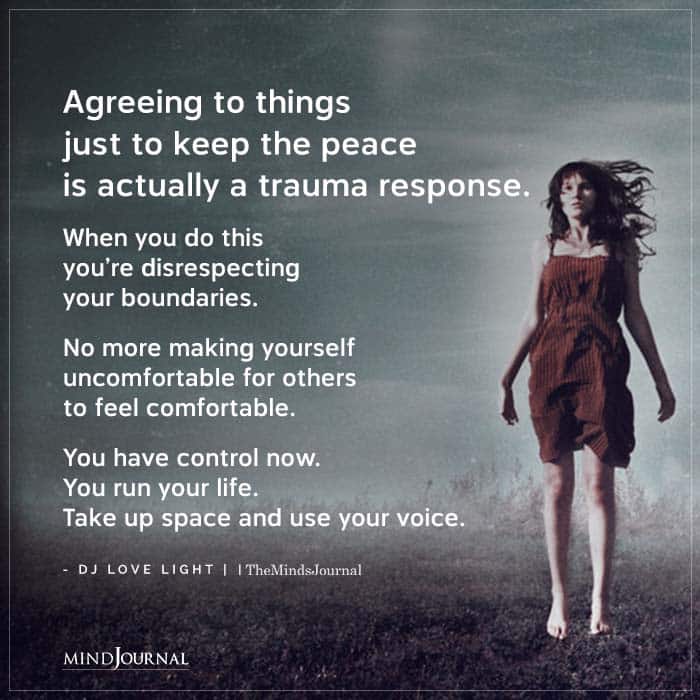
The “Fawn” trauma response is basically people-pleasing. If you operate in this survival mode, you will choose to appease and pacify others in order to avoid conflict and arguments. You will give in to every demand your partner makes just to make them happy.
Being another common sign among people with childhood trauma, this particular type of stress response makes you:
- Go out of your way to help others
- Lack a sense of self
- Struggle to express your opinion or say no
- Unable to lay down boundaries
- Get exploited
- Secretly resent your partner
People who had to appease their parents or other caregivers to avoid abuse or neglect, develop this type of trauma response. These trauma survivors are also fearful and insecure about their relationships just like the other three types.
The only difference is that, instead of avoiding, they try to charm their partners by being submissive. But, the underlying intention remains the same, that is avoiding the pain and trauma they had experienced before.
Read: 4 Types Of Attachment Style
How To Break The Unhealthy Pattern Of The Four Fs Of Trauma Responses?
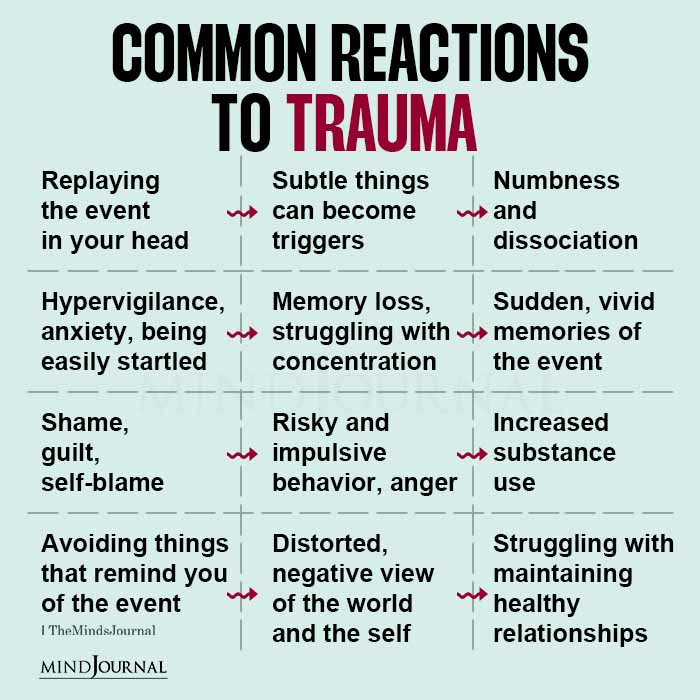
Healing your dysfunctional pattern of trauma responses is possible through therapy. You might also want to keep the following coping tips in mind:
- Always share your struggles with someone who will not judge you
- Open up with your partner regarding your traumatic experiences
- Journaling will help you take notice of your behavioral patterns
- Yoga and meditation will help you center yourself and calm your irrational fears
- Seek mental health care from a trauma-informed therapist
Love Yourself First
It is natural to feel frustrated when you hit one brick wall after another in your life, due to the 4 trauma responses, but please be patient and compassionate with yourself. What you have gone through is life-altering and extremely painful and it will take some time to unlearn the coping mechanisms and feel safe again.
The only thing that we all can do is take notice of our behavior and actions and try to be better than what we are today.
Did you like our article on the 4 trauma responses? Let us know your feedback on trauma responses 4Fs by commenting down below.
Frequently Asked Questions –
What types of behaviors come from trauma?
Trauma behaviors include emotional distress, intense fear, numbness, exhaustion, sadness, anxiety, dissociation, confusion, hostility, and other cognitive challenges.
What does processing trauma feel like?
Sitting with your trauma responses and your memories is not an easy feeling. You might feel triggered and get flashbacks, but it is essential for your healing and emotional well-being.
How does the body hold trauma?
Our body organs, endocrine glands, skin, tissues, and muscles have peptide receptors that can access and hold emotional information.
What are the four fear responses?
Trauma responses: fight, flight, freeze, and fawn.

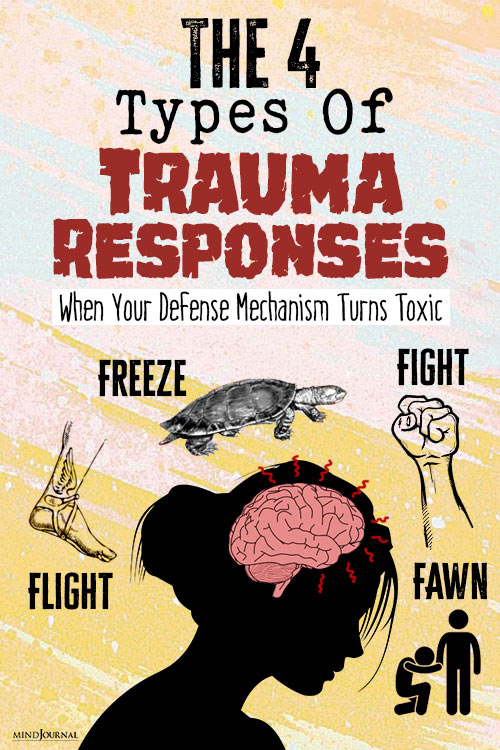

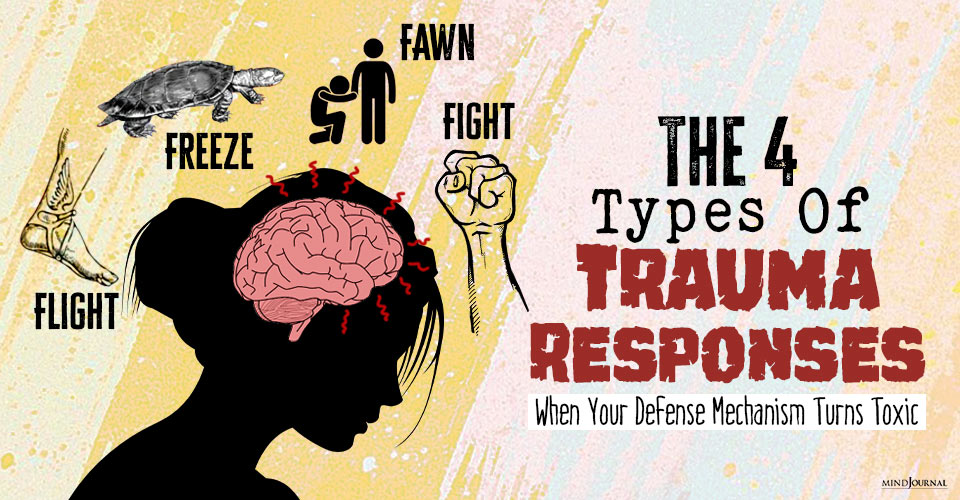







Leave a Reply